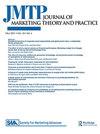监控我们的银行账户现金流对我们的忠诚卡有什么影响?
IF 5.3
Q2 BUSINESS
引用次数: 0
摘要
摘要本研究假设客户不一定使用忠诚卡来获得奖励。这项调查对来自理解社会创新小组的1500户家庭样本进行了logit回归,结果表明,对银行账户现金流不安全的客户更有可能拥有忠诚卡。检查他们的现金流经常起到框架效应的作用;因此,如果前景理论与忠诚卡相关,这里将对其进行探讨。这项工作从13种不同的忠诚卡和公司中得出结论,验证了上述见解以及忠诚卡所有权是否对性别敏感。本文章由计算机程序翻译,如有差异,请以英文原文为准。
What can monitoring our bank account cash flows say about our loyalty cards?
ABSTRACT The present research postulates customers do not necessarily use loyalty cards to gain their rewards. Applying a logit regression on a sample of 1,500 households from the Understanding Society Innovation Panel, this investigation shows that insecure customers about their bank account cash flows are more likely to own a loyalty card. Checking their cash flows frequently acts as a framing effect; thus, Prospect theory will be explored here if it is relevant in the loyalty card context. Drawing from thirteen different loyalty cards and firms, this work verifies the aforementioned insight and whether loyalty card ownership is gender-sensitive.
求助全文
通过发布文献求助,成功后即可免费获取论文全文。
去求助
来源期刊

Journal of Marketing Theory and Practice
BUSINESS-
CiteScore
6.80
自引率
6.70%
发文量
37
期刊介绍:
The Journal of Marketing Theory & Practice is devoted to the publication of peer-reviewed articles addressing substantive, managerial issues in marketing. In the context of developing, enhancing, and disseminating marketing knowledge, JMTP publishes both conceptual and empirical work, so long as the work provides strong implications for the managerial practice of marketing. Unlike other marketing journals that may be more focused on specific methodological approaches, deal with theoretical issues without regard to application, or represent various subfields of marketing, JMTP is positioned as a general marketing journal affording a quality outlet for more managerially-oriented research across the scope of the field.
 求助内容:
求助内容: 应助结果提醒方式:
应助结果提醒方式:


